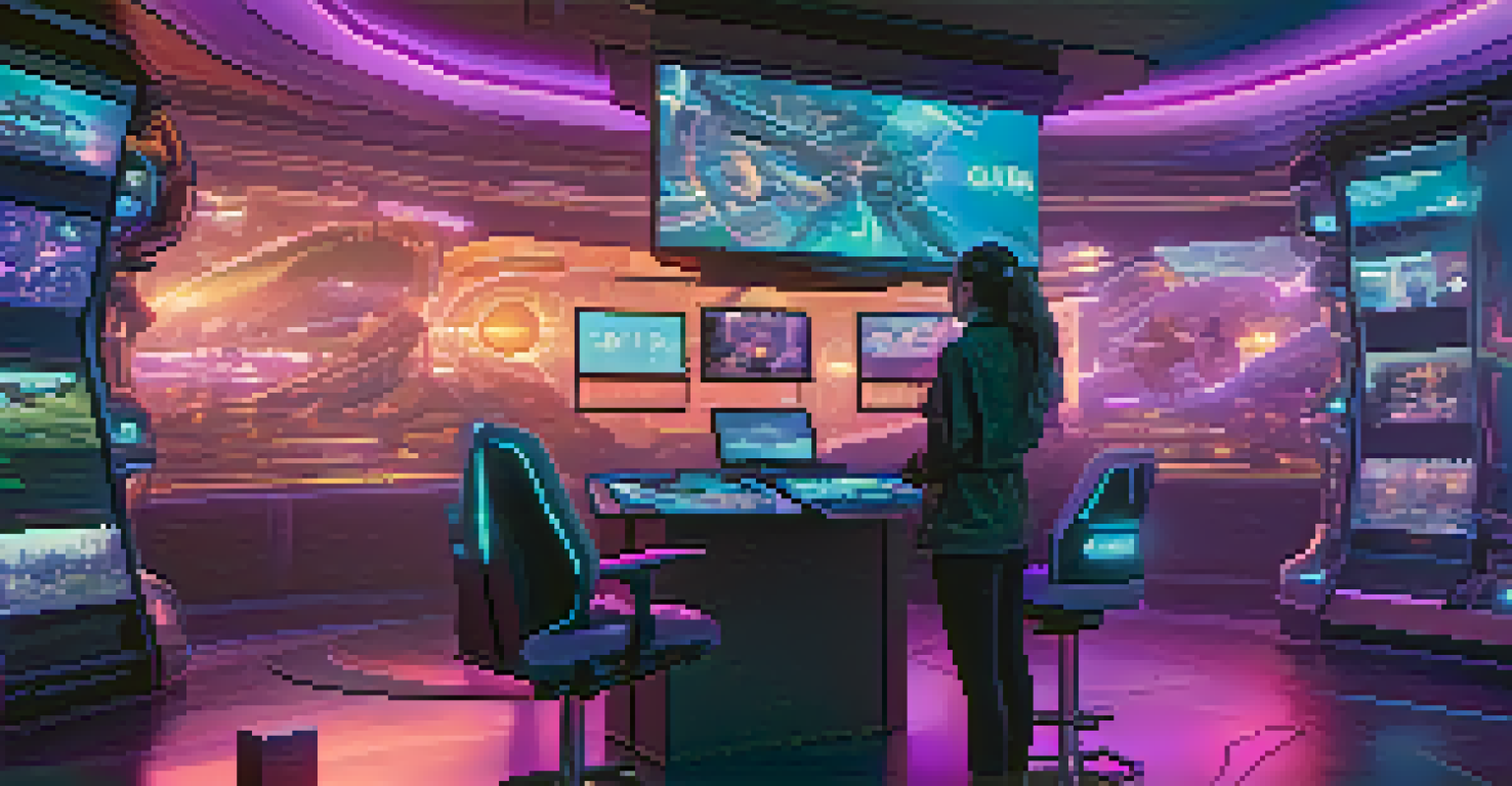The Benefits of Blockchain in Ethereum-Based Game Development

Understanding Blockchain and Ethereum in Gaming
Blockchain is a decentralized ledger technology that records transactions across many computers. In the gaming world, Ethereum serves as a popular blockchain platform enabling developers to create decentralized applications (dApps). This combination allows for transparency, security, and ownership within games, fundamentally changing how players interact with their in-game assets.
Blockchain is not just a technology; it's a new way of thinking about ownership and value.
For example, when you purchase a unique in-game item, blockchain ensures that the ownership of that item is securely recorded. This means that players can buy, sell, or trade their items without the risk of fraud. Moreover, the transparency that blockchain provides allows players to verify the authenticity of their assets, fostering trust in the gaming ecosystem.
Ultimately, understanding how blockchain and Ethereum work together creates a solid foundation for exploring the numerous benefits they bring to game development. From enhancing player experience to ensuring fair gameplay, the advantages are only beginning to unfold.
Enhanced Security for Game Assets
One of the standout benefits of using blockchain in game development is enhanced security. With traditional games, items can be easily duplicated or hacked, leading to a loss of value and trust. Blockchain technology, however, uses cryptography to secure assets, making it virtually impossible to counterfeit in-game items.

Imagine owning a rare sword in a fantasy game; with blockchain, that sword's authenticity is guaranteed. Players can rest assured that their valuable assets are safe from tampering or theft. This security not only protects players but also enhances the overall integrity of the game.
True Ownership via NFTs
Blockchain allows players to truly own in-game assets through Non-Fungible Tokens (NFTs), enabling them to buy, sell, or trade items across different games.
As a result, developers can create more immersive experiences, knowing that players have a stake in their in-game purchases. This security fosters a more engaging environment where players feel confident in their investments.
True Ownership of In-Game Assets
In traditional gaming, players often face the frustrating reality that they do not truly own the items they purchase. When a game server shuts down, all assets vanish into thin air. Blockchain changes this narrative by allowing players to have true ownership of their in-game assets through NFTs (Non-Fungible Tokens).
The future of gaming is in the hands of players, and blockchain is giving them the power to shape their experiences.
With NFTs, each item is unique and can be bought, sold, or traded on various marketplaces. This means that players can carry their assets across different games or platforms, creating a new level of value and engagement. For instance, a player could use their unique character skin in multiple games, enhancing their gaming experience.
This paradigm shift in ownership not only empowers players but also creates a vibrant economy surrounding in-game items. Players can monetize their skills and investments, making the gaming experience more rewarding.
Decentralized Game Economies and Play-to-Earn Models
Blockchain technology facilitates decentralized game economies, which can operate independently of traditional financial systems. This shift opens doors for innovative play-to-earn models, where players can earn real-world value from their gaming efforts. Imagine playing a game and receiving cryptocurrency or tokens for completing challenges or winning battles.
Games like Axie Infinity have already demonstrated the potential of this model, where players can earn money while enjoying their favorite pastime. This not only incentivizes gameplay but also attracts a broader audience, including those who may not have previously considered gaming as a viable income source.
Enhanced Security in Gaming
Utilizing blockchain technology enhances security for in-game assets, making it nearly impossible to counterfeit or tamper with items, thus fostering player trust.
By integrating blockchain, game developers can create self-sustaining ecosystems that benefit both players and creators. This mutual benefit fosters loyalty and community, making games more than just entertainment.
Transparency and Fairness in Gameplay
Blockchain promotes transparency in gaming, ensuring that players can trust the game's mechanics and outcomes. In traditional games, players often wonder about the fairness of algorithms used in matchmaking or loot drops. With blockchain, game rules and transactions are recorded on a public ledger, allowing anyone to verify them.
This transparency helps to eliminate cheating and manipulation within games, leading to a more level playing field for all participants. Players can feel confident that their skills and strategies are the only determinants of success, not hidden algorithms or unfair practices.
By prioritizing fairness, developers can cultivate a more engaged and satisfied player base, enhancing the overall reputation of their games.
Innovative Game Design Possibilities
The integration of blockchain opens up new avenues for innovative game design. Developers can create dynamic worlds where players have a real impact on the game's evolution. For example, community-driven decisions can shape game narratives, assets, and even economies.
Imagine a game where players collectively decide the fate of a virtual city, influencing its development and storytelling. This level of engagement not only enhances player experience but also fosters a sense of community and ownership.
Decentralized Game Economies
Blockchain facilitates decentralized game economies and play-to-earn models, allowing players to earn real-world value from their gaming activities.
By leveraging blockchain, developers can create immersive experiences that resonate with players on a deeper level, leading to more successful and sustainable game franchises.
Challenges and Considerations in Blockchain Gaming
While there are numerous benefits to blockchain in game development, it's essential to acknowledge the challenges that come with it. Technical hurdles, such as scalability and interoperability between different blockchains, can pose significant obstacles for developers. Ensuring a smooth user experience while leveraging blockchain technology remains a crucial consideration.
Moreover, the environmental impact of blockchain, particularly in terms of energy consumption, has come under scrutiny. Developers must seek eco-friendly solutions to mitigate these concerns, such as utilizing proof-of-stake mechanisms instead of proof-of-work.

Addressing these challenges is vital for the long-term success of blockchain in gaming. By being proactive and innovative, developers can create a sustainable future for blockchain gaming.
The Future of Blockchain in Game Development
As the gaming industry continues to evolve, the role of blockchain in game development is set to expand. With more developers recognizing the advantages of this technology, we can expect a surge in blockchain-based games that offer unique experiences and opportunities for players. The potential for innovation appears limitless, with new ideas continuously emerging in the space.
Future developments may include enhanced interoperability between games, allowing players to carry their assets across multiple titles seamlessly. This could lead to a more interconnected gaming landscape, where players feel a sense of belonging across different worlds.
Ultimately, the future of blockchain in game development looks promising, with the potential to reshape not just how games are played, but how players interact with and derive value from their gaming experiences.